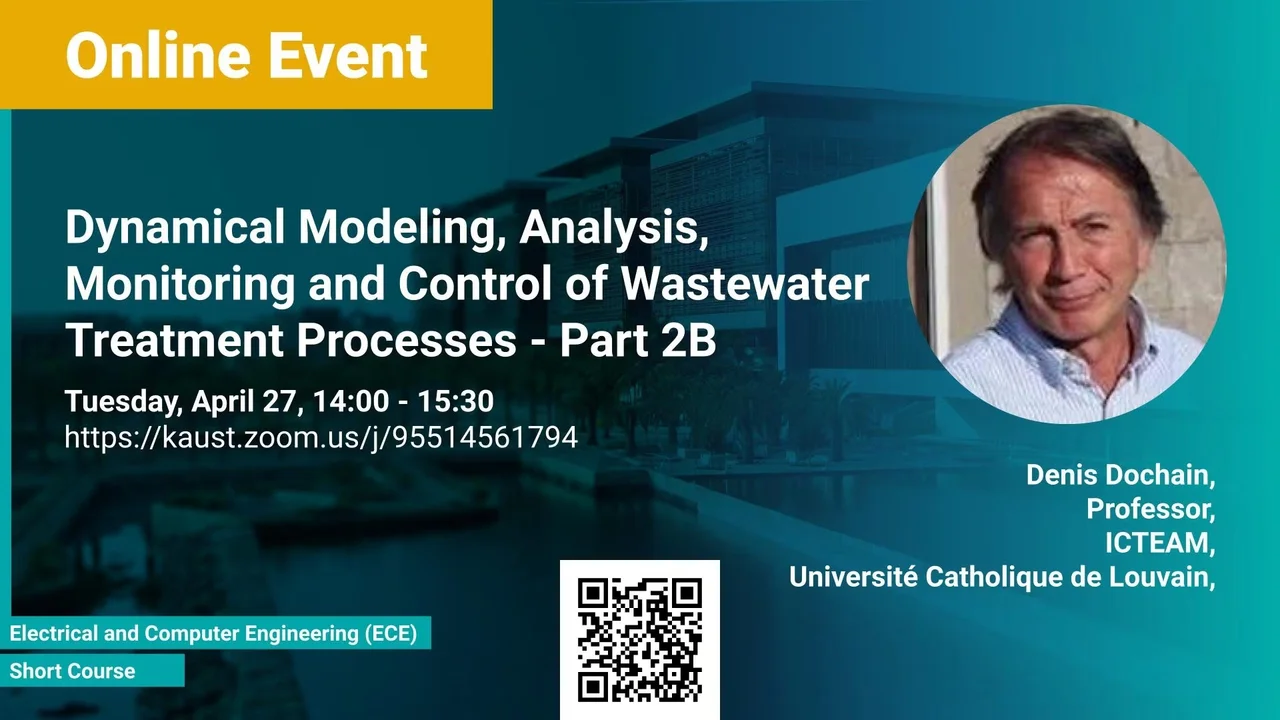
Dynamical Modeling, Analysis, Monitoring and Control of Wastewater Treatment Processes - Part 2B
- Prof. Denis Dochain, ICTEAM, Université Catholique de Louvain
KAUST
There are three main classes of wastewater treatment processes (WWTP’s): activated sludge, anaerobic digestion, and lagoon. The course will start to give a short introduction on these three types of WWTP’s. Each topic considered in the course will be illustrated via these three processes.
Overview
Abstract
There are three main classes of wastewater treatment processes (WWTP’s): activated sludge, anaerobic digestion, and lagoon. The course will start to give a short introduction on these three types of WWTP’s. Each topic considered in the course will be illustrated via these three processes.
Aim: The objective of this course is to give an introduction and cover recent aspects of dynamical modeling, monitoring and control of wastewater treatment processes. The course will cover the following topics.
Dynamical modeling of biochemical processes: the notion of reaction networks and mass balance modeling will be introduced and used to build a general dynamical model for wastewater treatment processes. Mathematical concepts of the general dynamical model, including model reduction and stability properties. The course will also cover the identification of WWTP models (including the structural and practical model identifiability and the design of optimal experiments for parameter estimation).
Monitoring: this part of the course will be dedicated to the design applications of state observers (Luenberger observers, Kalman filters, asymptotic observers) and parameter estimation algorithms (in particular to estimate reaction rates with observer-based estimators).
Control: the course will emphasize adaptive linearizing control (including adaptive extremum seeking). The choice of these control approaches will be motivated in the context of WWTP applications.
Brief Biography
Denis Dochain received his degree in Electrical engineering in 1982 from the Université Catholique de Louvain, Belgium. He completed his Ph.D. thesis and a « thèse d’agrégation de l’enseignement supérieur » in 1986 and 1994, respectively, also at the Université Catholique de Louvain, Belgium. He has been CNRS associate researcher at the LAAS (Toulouse, France) in 1989, and Professor at the Ecole Polytechnique de Montréal, Canada in 1987-88 and 1990-92. He has been with the FNRS (Fonds National de la Recherche Scientifique, National Fund for Scientific Research), Belgium since 1990. Since September 1999, he is Professor at the ICTEAM (Institute), Université Catholique de Louvain, Belgium, and Honorary Research Director of the FNRS. He has been invited professor at Queen’s University, Kingston, Canada between 2002 and 2004. He is full professor at the UCL since 2005. He is the Editor-in-Chief of the Journal of Process Control, senior editor of the IEEE Transactions of Automatic Control and associate editor of Automatica. He is active in IFAC since 1999 (Council member, Technical Board member, Publication Committee member and chair, TC and CC chair). He received the IFAC outstanding service award in 2008 and is an IFAC fellow since 2010. He received the title of Doctor Honoris Causa from the INP Grenoble on December 13, 2019.
His main research interests are in the field of nonlinear systems, thermodynamics based control, parameter and state estimation, adaptive extremum seeking control and distributed parameter systems, with application to microbial ecology, environmental, biological and chemical systems, and electrical and mechanical systems. He is the (co-)author of 5 books, more than 160 papers in refereed journals and 260 international conference papers.